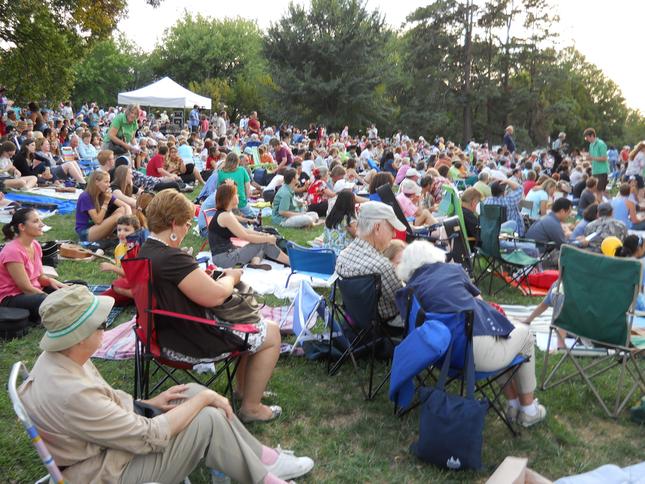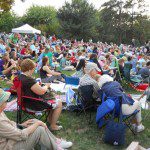Much To Do About Ukes
By • September 9, 2011 0 932

I didn’t know there was so much to know about the ukulele , or how many people were crazy about it.
What I learned about the ukelele came later, on Wikipedia, where else. I learned that it had come from Hawaii, which I sort of knew, that it originated in the 19th century as a Hawaiian interpretation of the cavaquuinho or braguinha and the rajao, which meant nothing to me, but they were both small guitar-like instruments which came to Hawaii by way of Portuguese immigrants and that the name “ukulele” translates out to something like “jumping flea”. Queen Lili’uokalani, the last Hawaiian monarch said it meant “the gift that here.” Either way is fine by me.
I’ve never touched a ukulele in my life until last week when I went to the last concert in the annual free outdoor summer concert series held on the lawn by a gazebo at the Strathmore Mansion, adjacent to the Music Center at Strathmore, and now, it appears, a new and classy housing development down the way a bit.
This was Strathmore’s Third Annual UkeFest, and all I can say is, who knew? There were, by an admittedly very rough guesstimate on my part a couple of thousand people spread out on the Strathmore rolling law, near a thousand of them carrying ukes of all sizes and designs with them. Like I said, who knew?
Strathmore’s Shelley Brown handed me this little itty bitty thing that looked like a toy. “It’s easy, try it,” she said. “Play the C note.” I played the C note. The earth did not move—that was the day before. But I was pleased, in a silly, stupid sort of way, as if I had done something really cool.
A fellow by the named of Michael Al Rosson understood perfectly. He had a mighty beard and looked and overalls and looked exactly like a uke player to me, those that don’t appear to be Samoans. “I work in the mail room at a research center,” he said. “I took it up about six years ago, and I got the fever, the uke fever. Never stopped. It’s easy to play. You can play just about anything. It’s fun. It has history. You can entertain people including yourself. And it’s really great to be here.”
Now he bills himself as a singer/songwriter/charactervoice perfsormer and Ukulele Enthusiast.
Just about the spiffiest cool looking ukulele dude there was ChristyLez Bacon, a self-described progressive hip-hop artist, but also a ukulele player. He had a cool hat, suspenders, his clothes looked ready-made from London by way of some dude shop in LA. He was as thin as a reed, with energy to burn.
So did this kid about five years old, who handled his little ukulele like it was a Rick James rock and roll and funk guitar. His sister looked at him skeptically, but he struck the pose and vogued his little self and played: something.
It was one of those things in a week of earthquakes and hurricanes and the usual slew of politics that could make you forget your cares and woes and play “Bye Bye Blackbird”. You can on the uke. Rudy Vallee, when he wasn’t holding a megaphone, played the uke in the Roaring Twenties when it was mysteriously popular in the United States.
That ended with the Depression, but the uke has resurfaced in a big way in the aftermath when Hawaiian musician Israel Kamakawiwo’ole made it popular all again with uke renditions of “Over The Rainbow” and “What a Wonderful World”, which went viral on the Internet in a good way, making people laugh and cry at the same time.
At Strathmore, they were trying to break the Guinness Book of World Record uke record for the largest Ukulele Ensemble ever, which stood at 851. The gathered thousand or more easily swept by that with well over 900, all of which raised high in the air, as if the night was the ukulele Agincourt, which it probably was.
That record lasted a little because news on the Guinness website said that some Swedes had set a new mark well over a thousand.
Silly Swedes
Such news, in the uke world, don’t mean a thing, because it don’t have that swing. Because the instrument produces sounds, plays songs, and music that make you in the dark of the night pretty happy or at least not lonesome.
It showed in the family-like sun-setting fervor of the Uke Setting, where the Riders, amateur musicians from the Riderwood Retirement Community showed up and played in Hawaiian shirts, and youngsters fromn the Piney Branch Kids Ukulele Ensemble layed as Gerald Ross, blending humor jazz and blues, the terrific ladies duo of The Sweater Set, and hosts Marcy Marxer and Cathy Fink led the crowd in a rendition of “This Land is Made for You and Me”, as the smell of fried chicken wafted in the air.
That magnificent C Note. If only we all had one.
- Festival-goers enjoyed the uke concert. | Gary Tischler



